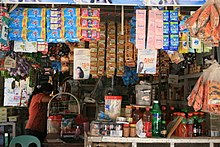
Back Tindahan na sari-sari BCL Sari-Sari store CEB Tienda de sarisari Spanish Sari-sari-winkel Dutch Tindahang sari-sari Tagalog
This article needs additional citations for verification. (March 2019) |

A sari-sari store, anglicized as neighborhood sundry store,[1] is a convenience store found in the Philippines. The word sari-sari is Tagalog meaning "variety" or "sundry". Such stores occupy an important economic and social location in a Filipino community and are ubiquitous in neighborhoods and along streets. Sari-sari stores tend to be family-run and privately owned[1] operating within the shopkeeper's residence.
Commodities are displayed in a large screen-covered or metal-barred window in front of the shop.[2] Candies in recycled jars, canned goods, and cigarettes are displayed while cooking oil, salt, and sugar are stored at the back of the shop. Prepaid mobile phone credits are provided.[2] The sari-sari store operates with a small revolving fund,[1] and it generally does not offer perishable goods requiring refrigeration.[3] The few that do have refrigerators carry soft drinks, beers, and bottled water.[2]
- ^ a b c Pinstrup-Andersen, Marito Garcia, Per (1987). The pilot food price subsidy scheme in the Philippines : its impact on income, food consumption, and nutritional status. Washington, D.C.: International Food Policy Research Institute. ISBN 0896290638.
{{cite book}}: CS1 maint: multiple names: authors list (link) - ^ a b c "Business at its most basic: putting up a retailing store". www.serdef.org. Small Enterprises Research and Development Foundation. June 16, 2011. Retrieved May 16, 2016.
- ^ Schelzig, Karin (2005). Poverty in the Philippines: Income, Assets, and Access. Asian Development Bank. ISBN 9715615635.